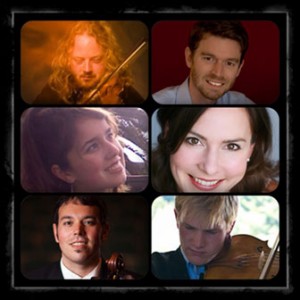
What do San Francisco and Toronto have in common? Both are close to Edwin Huizinga’s heart. The former is the founding place of Classical Revolution of which Edwin has been a part of since its inception, and the latter is where he brought it in 2010, shortly after the Canadian had moved to Toronto.
- PREVIEW | Soundstreams Celebrates Mandela’s Dreams In “Music Of The Rainbow Nation” - November 17, 2016
- Soundstreams’ “Encore” curates a cultural experience without bounds - October 16, 2014
- PREVIEW | Soundstreams opens season with loving tribute to Vivaldi in “The Seasons” - September 26, 2014
Saturday night in the salon-like setting of Gallery 345, the audience was treated to a stellar performance jointly presented by Classical Revolution (classicalrevolution.org) and Vocallective (vocallective.com), a similar group founded in San Francisco by Indre Viskontas but with a vocal twist.
The programme titled Time Stands Still featured accomplished musicians from both countries brought together by Huizinga to perform an exquisite evening of chamber music.
Cellist Charles Akert, the youngest member to join the Fairbanks Symphony and the Arctic Chamber Orchestra at 13 years of age, performed in all of the pieces with a great sensitivity to the music and an understated virtuosity that was a great counterpoint to violinist Huizinga’s more raw and intense style of performance.
The first half of the programme reflected a variety of ethnic roots from very distinct eras. They opened with the first and sixth movements of Antonin Dvorák’s Dumky Trio, Op. 90, which pianist Ian Scarfe prefaced with an elegant explanation of the Ukranian folk dance, the dumka, a form that starts in a melancholy mood associated with the death of a loved one, followed by a vibrant dance that elevates the spirit.
The contrast of moods was deftly rendered, with particular care in balance and blending, setting a high standard for the rest of the evening.
Next was Winter from Astor Piazzolla’s The Four Seasons of Buenos Aires. Even without dancers present, the performance had all the sensuality and passion of the Argentinian tango, and drew out a wide range of nuances from the score and held me captivated.
The last piece in the first half featured two works written for soprano and string quartet by Osvaldo Golijov, a contemporary Argentinian-American composer. Lua Descolorida is based on a poem written by Rosalia de Castro, while How Slow the Wind is based on a poem by Emily Dickinson. Both works are a tender and reflective response to tragic themes, and are the first chamber works that Lithuanian-Canadian soprano Indre Viskonta performed in her career while working closely with Golijov. She did an immaculate job of drawing out depth of emotion and connecting with the rest of the ensemble.
A string quartet was completed by young violinist Aniela Eddy, currently pursuing her Masters of Music at Cleveland, and vioist Rory McLeod, who performs regularly with the Canadian Opera Company, Kitchener-Waterloo Smphony, and the National Ballet of Canada Orchestra.
The second half of the program featured Dmitri Shostakovich’s Quintet for Piano and Strings, Op. 57, and Ernest Chausson’s Le Coffret de Santal in Chanson perpétuelle no. 2, Op. 37., in the version for soprano, piano and string quartet.
The quintet is an intense work and well known to those who love chamber music. Scarfe performed with an incredible touch and ability to define each note with its own character, without compromising the overarching shape of the melodies. Akert was outstanding in his ability to play long drones with richness and building long crescendos and decrescendos with incredible drama on the cello.
Overall the piece was rendered with staggering virtuosity without ever compromising ensemble balance, giving the piece a fresh and raw interpretation. It is hard to believe that these are not performers who play together regularly. Huizinga is a remarkable performer who sets the bar high for himself, and draws out the best of all those who perform with him.
The Chausson was a sweet farewell after all this intensity, and a last chance to hear Viskonta’s warm and delectable voice.
In such an intimate space, the performers’ intensity was infectious, as were the wordless exchanges between them and the unselfconscious expressions of joy during various passages.
Now that Huizinga has completed nine months of travel in collaboration with artists within and outside of the classical genre, we should look forward to seeing more of him — and Classical Revolution hopefully developing a larger following in Toronto.
Margaret Lam
- PREVIEW | Soundstreams Celebrates Mandela’s Dreams In “Music Of The Rainbow Nation” - November 17, 2016
- Soundstreams’ “Encore” curates a cultural experience without bounds - October 16, 2014
- PREVIEW | Soundstreams opens season with loving tribute to Vivaldi in “The Seasons” - September 26, 2014



